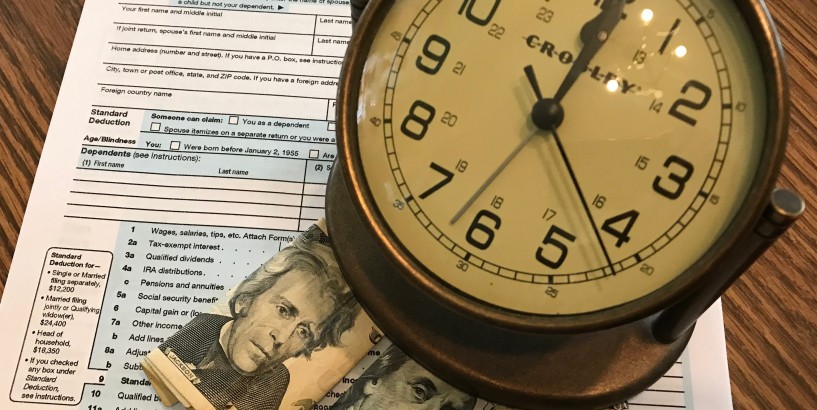Losing track of the calendar is part of everyday life during the coronavirus pandemic. So it wouldn't be shocking if you didn't realize that April 15 is right around the corner. And now the good news: This year, April 15, which is Wednesday, isn't what it used to be, either. It doesn't matter if you're sick, quarantined or perfectly healthy but trying to keep others safe by sitting at home, you now have a new one-time July 15 income tax deadline to consider when it comes to filing returns. It's all part of our new normal. The delay is designed to give a financial break to taxpayers who may be having a hard time making ends meet, as hours are cut and workplaces are closed to combat the spread of the coronavirus. If you did not file your federal income tax return or your state income tax return, there is no reason to panic about the traditional April 15 income tax deadline. Most states have extended the filing deadline into next month and beyond , with Virginia setting a May 1 due date but charging no late penalties on payments made by June 1. Many states, including Alabama, California and Michigan, are extending the deadline to July 15, the same date as federal income taxes are now due. If you still want to do your taxes by April 15 for some reason, though, it's getting harder to find help. The IRS noted Thursday that its live telephone assistance is unavailable because of COVID-19. "Normal operations will resume when possible," the IRS said. If you want information, go to IRS.gov or IRS.gov/Refunds to check on the status of your federal income tax refund. We’re now looking at a 90-day extension – moving the deadline from April 15 to July 15 – that applies to individual taxpayers filing a Form 1040 or 1040SR , which can be used for taxpayers who are 65 or older. And taxpayers are now looking at a trifecta of sorts. Taxpayers can hold onto their hard-earned money for a while longer, send in a return along with any payment due on or before July 15, and face no penalty or interest charges from the Internal Revenue Service if they choose to wait 90 days, said Ken Milani, professor of accountancy at the Mendoza College of Business at the University of Notre Dame. The no-interest, no-penalty status applies to many state and city extensions, as well. Payments that were due April 15 for the first quarter of 2020 are now delayed until July 15. The delay applies to estimated income tax payments for both federal and state income taxes, in Michigan, for example. In Michigan, estimated payments for cities for the first quarter that were due April 30 are extended to July 31. The IRS last week announced another new twist and extended relief to estimated payments that were due June 15. Any individual or corporation that has a federal quarterly estimated tax payment due on or after April 1 and before July 15, according to the IRS, can wait until July 15 to make that payment without penalty. About 1 million taxpayers across the country would be eligible to claim refunds that were owed for their 2016 federal income tax returns. On Thursday, the IRS announced a new change and noted that taxpayers who typically would need to file a 2016 federal income tax return by April 15 to claim that money now have until July 15. Taxpayers do not face a penalty for filing a late return – if they're owed a refund. If taxpayers do not file a return within three years, the money becomes property of the U.S. Treasury. The law requires taxpayers to properly address, mail and ensure the tax return is postmarked by the July 15 deadline. There is no online list to check or email on the way to tell you that you're owed money because you didn't file a 2016 federal income tax return. You've simply got to file a return to find out. Some of the unclaimed refund money could belong to students, part-time workers and others who may have overlooked filing a return. They might not make enough money to be required to file a return. But they could be owed a refund because they had tax dollars withheld out of their paychecks and they don't owe taxes. If you're owed an income tax refund for 2019, it's perfectly fine to file your state and federal income taxes long before the July 15 deadline. Many people have already filed those 2019 income tax returns. The IRS reported that 90.6 million federal income tax returns were received through the week ending March 27, down 2.4% from the same time a year ago. The IRS processed 87 individual income tax returns, down 3.6% from the same time a year ago. So far, $203.4 billion in income tax refunds have been issued, down 1.3% from a year ago. The average refund is $2,908 – up 1.2% from a year ago. While many tax preparation offices are closed during "Stay Home, Stay Safe" orders, several companies offer online or other options. If you qualify, you may also have access to "Free File" via IRS.gov. Your income would need to be $69,000 and below. You do want to get your tax refund as early as possible especially if you've lost your job or have seen a sizable drop in wages during the coronavirus pandemic. at stompor@freepress.com or follow her on Twitter @ tompor .
© 2024, Copyrights gulftimes.com. All Rights Reserved









